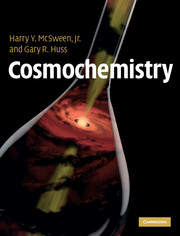Book contents
- Frontmatter
- Contents
- Preface
- 1 Introduction to cosmochemistry
- 2 Nuclides and elements: the building blocks of matter
- 3 Origin of the elements
- 4 Solar system and cosmic abundances: elements and isotopes
- 5 Presolar grains: a record of stellar nucleosynthesis and processes in interstellar space
- 6 Meteorites: a record of nebular and planetary processes
- 7 Cosmochemical and geochemical fractionations
- 8 Radioisotopes as chronometers
- 9 Chronology of the solar system from radioactive isotopes
- 10 The most volatile elements and compounds: organic matter, noble gases, and ices
- 11 Chemistry of anhydrous planetesimals
- 12 Chemistry of comets and other ice-bearing planetesimals
- 13 Geochemical exploration of planets: Moon and Mars as case studies
- 14 Cosmochemical models for the formation of the solar system
- Appendix: Some analytical techniques commonly used in cosmochemistry
- Index
- References
1 - Introduction to cosmochemistry
Published online by Cambridge University Press: 05 June 2012
- Frontmatter
- Contents
- Preface
- 1 Introduction to cosmochemistry
- 2 Nuclides and elements: the building blocks of matter
- 3 Origin of the elements
- 4 Solar system and cosmic abundances: elements and isotopes
- 5 Presolar grains: a record of stellar nucleosynthesis and processes in interstellar space
- 6 Meteorites: a record of nebular and planetary processes
- 7 Cosmochemical and geochemical fractionations
- 8 Radioisotopes as chronometers
- 9 Chronology of the solar system from radioactive isotopes
- 10 The most volatile elements and compounds: organic matter, noble gases, and ices
- 11 Chemistry of anhydrous planetesimals
- 12 Chemistry of comets and other ice-bearing planetesimals
- 13 Geochemical exploration of planets: Moon and Mars as case studies
- 14 Cosmochemical models for the formation of the solar system
- Appendix: Some analytical techniques commonly used in cosmochemistry
- Index
- References
Summary
Overview
Cosmochemistry is defined, and its relationship to geochemistry is explained. We describe the historical beginnings of cosmochemistry, and the lines of research that coalesced into the field of cosmochemistry are discussed. We then briefly introduce the tools of cosmochemistry and the datasets that have been produced by these tools. The relationships between cosmochemistry and geochemistry, on the one hand, and astronomy, astrophysics, and geology, on the other, are considered.
What is cosmochemistry?
A significant portion of the universe is comprised of elements, ions, and the compounds formed by their combinations – in effect, chemistry on the grandest scale possible. These chemical components can occur as gases or superheated plasmas, less commonly as solids, and very rarely as liquids.
Cosmochemistry is the study of the chemical composition of the universe and the processes that produced those compositions. This is a tall order, to be sure. Understandably, cosmochemistry focuses primarily on the objects in our own solar system, because that is where we have direct access to the most chemical information. That part of cosmochemistry encompasses the compositions of the Sun, its retinue of planets and their satellites, the almost innumerable asteroids and comets, and the smaller samples (meteorites, interplanetary dust particles or “IDPs,” returned lunar samples) derived from them. From their chemistry, determined by laboratory measurements of samples or by various remote-sensing techniques, cosmochemists try to unravel the processes that formed or affected them and to fix the chronology of these events.
Information
- Type
- Chapter
- Information
- Cosmochemistry , pp. 1 - 28Publisher: Cambridge University PressPrint publication year: 2010
References
Accessibility standard: Unknown
Why this information is here
This section outlines the accessibility features of this content - including support for screen readers, full keyboard navigation and high-contrast display options. This may not be relevant for you.Accessibility Information
- 1
- Cited by
